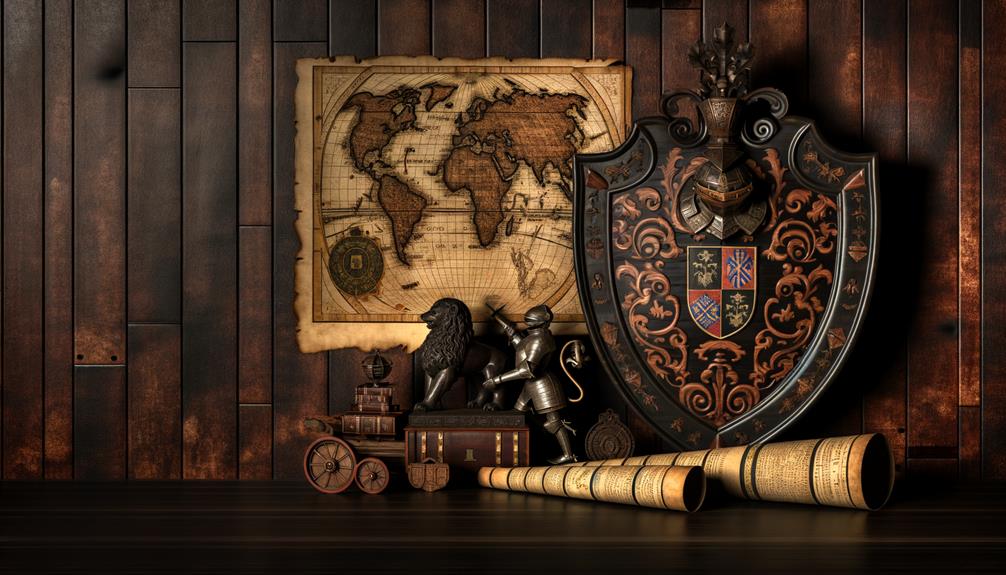Marshall Name Meaning and Origin
The name 'Marshall' originates from the Old French term 'mareschal,' derived from the Frankish word 'marahskalk,' meaning 'horse servant.' Initially associated with the care of horses in feudal societies, it evolved into a title of authority in military contexts. During medieval times, a marshal oversaw stables, governance, and military organization.
Over centuries, the role expanded to law enforcement and estate management, highlighting shifts in political hierarchies. The title spread globally through colonial expansions and international exchanges, maintaining significant relevance in various administrative frameworks.
Discover more about its intricate evolution and enduring global impact.

Key Takeaways
- The name 'Marshall' originates from the Old French term 'mareschal.'
- It derives from the Frankish word 'marahskalk,' meaning 'horse servant.'
- Initially, 'Marshall' referred to caretakers of horses in feudal societies.
- The title evolved to signify high-ranking officers in military and governance.
- 'Marshall' has been adapted globally, reflecting shifts in political and administrative functions.
Etymology of 'Marshall'
The etymology of the name 'Marshall' can be traced back to the Old French term 'mareschal,' which itself derives from the Frankish word 'marahskalk,' comprising 'marah' meaning 'horse' and 'skalk' meaning 'servant.' This linguistic evolution points to the name's original association with a person responsible for the care of horses, a role of significant importance in feudal societies.
Over time, the term broadened in scope, encompassing higher ranks of service and command, particularly in military contexts. The semantic shift from a literal 'horse servant' to a title of authority illustrates the dynamic nature of language and societal structures.
Medieval Roots
Rooted in the medieval period, the name 'Marshall' emerged as a prominent title within feudal hierarchies, signifying a role that extended beyond horse care to encompass various administrative and military responsibilities. Originating from the Old High German term 'marahscalc,' the Marshall was initially responsible for overseeing stables and managing horses.
However, as feudal structures evolved, the scope of the Marshall's duties expanded significantly. They began to assume essential roles in the governance and military organization of estates, often acting as high-ranking officers or officials within noble courts. This evolution reflects the Marshall's elevated status and integral function within medieval society, underscoring their importance in maintaining order, executing strategic tasks, and supporting the logistical needs of the domain.
Occupational Significance
In examining the occupational significance of the name 'Marshall,' it is paramount to explore the multifaceted responsibilities that evolved alongside the term's historical context. Traditionally, a Marshall was a high-ranking officer in royal households or military establishments, entrusted with critical tasks essential for maintaining order and operational efficiency. This role encompassed a diverse array of duties:
- Supervision of Stables: Overseeing the care and management of horses, a crucial asset in medieval times.
- Law Enforcement: Implementing legal judgments and ensuring adherence to laws within the jurisdiction.
- Military Command: Leading troops and strategizing during warfare, underscoring the role's martial essence.
- Estate Management: Administering estates, encompassing resource allocation and logistical oversight.
These responsibilities highlight the Marshall's integral role in both governance and military domains.
Evolution Over Centuries
As societal structures and governance evolved over the centuries, the role of the Marshall adapted to meet the changing needs and complexities of different eras.
Initially serving as caretakers of horses and stables in medieval Europe, Marshalls evolved into more authoritative roles, including military commanders and law enforcement officials.
By the late Middle Ages, their responsibilities expanded to include overseeing legal matters and maintaining public order. The title's evolution reflects broader shifts in political hierarchies and administrative functions, showcasing its versatility and enduring relevance.
This adaptability ensured that the Marshall remained integral to societal frameworks, evolving from a specialized servant role into a multifaceted position of significant influence and responsibility within various governance structures.
Global Spread
The evolution of the Marshall's role over centuries set the stage for its global spread, as various cultures and governance systems adopted and adapted the title to meet their unique needs and challenges.
The Marshall title transcended its medieval European origins, embedding itself in various national contexts and administrative frameworks. This diffusion was facilitated by colonial expansions, international trade, and diplomatic exchanges, leading to a diverse array of interpretations and implementations.
- Medieval Europe: From battlefield commanders to court officials.
- Colonial America: Adapted as a judicial and law enforcement title.
- Modern Military: High-ranking officers in armed forces globally.
- International Organizations: Marshalls in ceremonial and governance roles.
This widespread adoption underscores the title's versatility and enduring significance in global sociopolitical landscapes.
Notable Marshalls
Prominent individuals bearing the title or surname Marshall have greatly influenced various fields, ranging from governance and law enforcement to military leadership and cultural contributions.
In the legal arena, John Marshall stands out as a pivotal figure, having served as the fourth Chief Justice of the United States, where his rulings helped shape American constitutional law.
In the military, General George C. Marshall played an essential role during World War II and later devised the Marshall Plan, which aided Europe's post-war recovery.
Cultural contributions are exemplified by Thurgood Marshall, the first African American Supreme Court Justice, who made significant strides in the civil rights movement.
These Marshalls exemplify the diverse impacts individuals with this name have had on society.
Conclusion
In summation, the name 'Marshall' embodies a rich tapestry of historical significance, rooted in medieval occupational roles and evolving through centuries to achieve global prominence.
Like a thread woven through the fabric of time, its etymology reflects a journey from horse-keeping to positions of authority.
This enduring legacy, bolstered by notable individuals bearing the name, underscores its lasting relevance and cultural impact.
The evolution of 'Marshall' exemplifies how names can encapsulate history, function, and identity.






